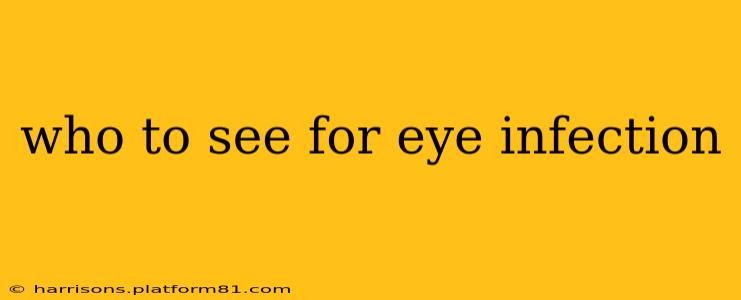An eye infection, whether it's pink eye (conjunctivitis), a corneal ulcer, or another issue, is never fun. The burning, itching, and discomfort can significantly impact your daily life. Knowing who to see for prompt and effective treatment is crucial to prevent complications and speed up recovery. This guide will help you navigate your options and understand when to seek professional medical attention.
Who Should I See First for an Eye Infection?
Your first stop for an eye infection should be your primary care physician (PCP), especially if you're unsure of the cause or severity. They can perform a preliminary examination, determine the likely cause, and advise you on the next steps. This is particularly important if you have other underlying health conditions or if the infection doesn't improve after a few days of home care.
However, for many eye infections, especially those that are clearly bacterial or viral conjunctivitis (pink eye), you might find it quicker and more convenient to see an ophthalmologist or an optometrist.
What's the difference between an ophthalmologist and an optometrist?
-
Ophthalmologists are medical doctors (MDs or DOs) who specialize in eye and vision care. They can diagnose and treat a wide range of eye conditions, including infections, perform eye surgery, and prescribe medications. They're the best choice for more serious eye infections or complications.
-
Optometrists are healthcare professionals who provide primary vision care, including eye exams, diagnosing and managing certain eye diseases, and prescribing eyeglasses or contact lenses. While they can often manage simpler eye infections, they may refer you to an ophthalmologist for more complex cases.
When Should I Go to the Emergency Room for an Eye Infection?
While most eye infections don't require emergency care, there are situations where immediate medical attention is necessary. Seek emergency care if you experience:
- Sudden, severe vision loss: This could indicate a serious underlying condition.
- Intense eye pain: Severe pain is a warning sign of a potentially serious problem.
- Eye trauma: Any injury to the eye, such as a foreign object or blunt force trauma, needs immediate medical attention.
- Significant swelling or redness: Unusual or excessive swelling or redness could suggest a more severe infection.
- Symptoms worsening despite treatment: If your symptoms are getting worse even after starting treatment, seek immediate medical attention.
What are the common symptoms of an eye infection?
Common symptoms include:
- Redness: This is often the most noticeable symptom.
- Itching: This can be intense and irritating.
- Burning or stinging: This sensation can be very uncomfortable.
- Discharge: This can be clear, watery, yellow, or green, depending on the cause of the infection.
- Swollen eyelids: The eyelids may become puffy and swollen.
- Sensitivity to light (photophobia): Bright light may be painful.
- Blurry vision: This can be a symptom of a more serious infection.
It's important to note that these symptoms can vary depending on the type and severity of the infection.
Can I treat a mild eye infection at home?
For very mild, suspected viral conjunctivitis (pink eye), some home remedies might offer temporary relief. These include:
- Warm compresses: Applying warm compresses to your eyes can help soothe irritation and reduce swelling.
- Rest: Getting plenty of rest can help your body fight off the infection.
- Avoid touching your eyes: This will help prevent the spread of infection.
- Wash your hands frequently: Good hand hygiene is crucial to prevent the spread of infection.
However, it is crucial to understand that home remedies are not a replacement for professional medical advice. Always consult a healthcare professional to get a proper diagnosis and treatment plan. Self-treating can potentially worsen the infection or mask a more serious underlying condition.
How can I prevent eye infections?
Practicing good hygiene is key to preventing eye infections. This includes:
- Washing your hands frequently: This is especially important after touching your eyes or face.
- Avoiding touching your eyes: This helps prevent the spread of germs.
- Using clean towels and washcloths: Do not share towels or washcloths with others.
- Wearing protective eyewear: This is important when working with chemicals or dust.
- Practicing good contact lens hygiene: Properly clean and store your contact lenses.
By understanding who to see for your eye infection and recognizing when immediate medical attention is needed, you can ensure timely and effective treatment and protect your precious eyesight. Remember, a prompt visit to a healthcare professional is the best way to ensure a swift and complete recovery.
